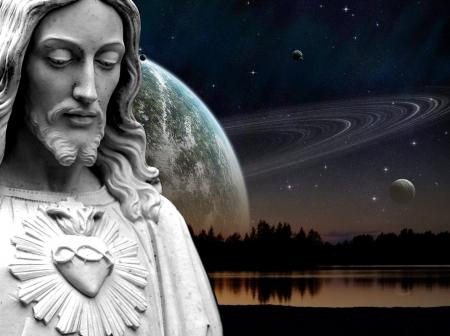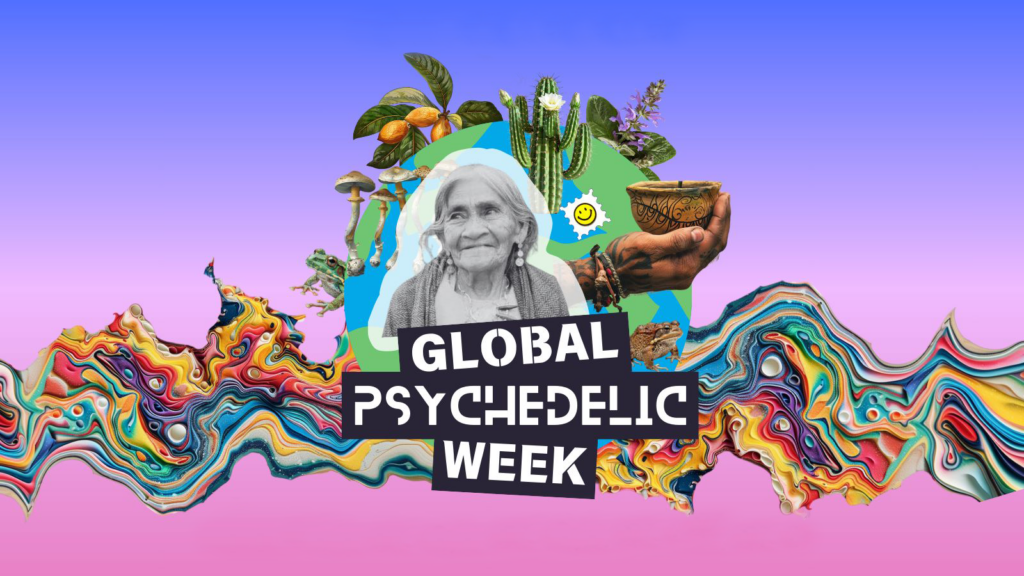Growing up in the Christian, evangelical church and studying ayahuasca the past six years I've witnessed and studied many subtleties about the way in which religious doctrines can turn into limitations or roadblocks in our relationship to God and each other. The new age movement is a young, highly innovative religious development on the planet, and we can avoid the trap of extremism if we carefully study its implied doctrines.
Here are a list of what are in my opinion three of the most commonly invoked, "new age" teachings along with the ways in which these teachings can infiltrate and create division and yet another breed of religious extremism.
Let's start with the most basic New Age teaching.
Everything is One
The teaching is obvious enough to those of us who have had an ecstatic heart and mind opening experience. Whether it comes through meditation, a yoga class, a relationship, a job, a synchronicity, or a good book, we all know what it's like to have a "witness consciousness" experience. We step outside of our egos, our "stories," and our body identification. We see something more. Our identity breaks out of old containers and boundaries and something new is born. We sense that this "birth and death" process is universal, and we intuitively feel the presence of unity throughout creation.
Then as we walk away from the experience everything changes. At this moment it's tempting to say that the wisdom leaves us or that it lessens, that we come off the mountain. In truth all of our peak experiences are still with us right now. They simply integrate back into the dimension of dualism, of our separate body, separate soul, separate heart and mind.
People get very subtly frustrated by the coming and going of this dualism and non-dualism, these peak religious experiences and how they integrate back into time and space, and so we often project our frustration onto others with a teaching called, "everything is one." These very words we speak often mean nothing, even though the logic has echoes of the moment we realized its truth, the moment we were sitting in yoga class and had our breakthrough.
Here is a great example. People often rag on Christians for the distinction that they make between good and evil. People often rag on the USA for having perceived "enemies" or US citizens often get enraged when its suggested that the USA might be the real 'bad guy.' It's completely understandable. We are all together in creation. There are no outsiders inside time and space, where we all are. But we miss a key irony in our judgment of the good/evil dichotomy. Namely that we are still judging something. We are condemning a dichotomy that first exists before it can be condemned.
By saying "everything is one" we push aside good and evil because we would rather imagine a universe in which good and evil are an illusion, and so when people talk about "Bad" experiences or "evil" in the world, we think to ourselves, "that person is lost in illusion," or we slyly say, "Well, it's just a matter of getting outside of judgment and seeing the world through eyes of unconditional love." These statements are of course true, but if they are being used as a cloaked way of devaluing something, even a "black and white" worldview, then they are guilty of marginalizing something all over again. "Well, we don't need a system of good and evil in the world because systems of good and evil are evil." This is of course hypocrisy.
The notion of a transcendent God is just as important as that of an imminent God. Both are features of serious spiritual evolution and our experience of our own consciousness at any given moment. What do we mean when we say, "everything is one?" We often mean that God is not separate from us. God lives in us. God is the totality of all reality. Reality is one. Everything is one. In astrological terms this is our experience of the Moon.The eternal presence. The reflective light of the Sun shimmering off the moon. The light in the dark. This presence of God is with us all the time, and we are never apart from the eternal nature of all creation.
In a world where masculine power hunger is currently undergoing a major transformation it's easy to marginalize a healthy solar point of view. The solar point of view is the idea that God is not just imminent but also transcendent. In fact, the very statement "everything is one," rests on the implication that everything "is not one" but "two"or more. And so much more. The solar principle of consciousness suggests that we have something to strive for. That time and space are separate. That the spirit world is filled with good spirits and bad spirits, or healthy and suffering spirits, that the world is filled with lower urges and higher urges, and that we have to learn how to ascend or transcend. That, like plants, our souls grow toward the sun: toward God realization.
The fact that we have a monthly lunar cycle that interacts intimately with the Sun, that we have eclipses throughout the year, equinoxes and solstices, is evidence that our spirituality needs both of these worldviews to function totally. So, when we say "everything is one," we need to remember the truth of that statement rests upon the other reality, where "everything is two." In that realm, which is a daily part of our experience, good and evil (powerful words, I know) are real categories. Separation is real. Time and space are real. Hell is real. But none of these places or dimensions are eternally separate. These dimensions are an aspect of oneness. Perhaps the best and most underrated teaching about the life of Jesus is the resurrection and ascendance of Jesus after his death. All of our avatars have taught us that form can be experienced perfectly as much as it can be degraded or transcended.
So, I've learned to be careful. When I say "everything is one," where am I coming from? Is there something I'm resisting? I pray for awareness of the divinity in separation these days as often as I pray for the dissolution of boundaries.
Don't think so much
This teaching is also such a good one. We have to be careful not to get stuck in our head. It's true. But the cool thing about the mind is that it can travel backward and forward in time and space while remaining local in the body. We use it to understand it. It can harm itself and it can elevate itself. It's hard to learn how to drive the vehicle of the mind like its hard for a young person to sit through drivers training courses. After a few youthful road accidents many of us purchase a mental insurance policy called "Get out of your head. Don't think so much."
Astrologically I notice that a person's relationship to the mind has a lot to do with where Mercury is in the birth chart and what aspects its making. For example, I notice that watery Mercury people (people with Mercury located in Pisces, Scorpio, or Cancer) tend to have an emotional thought life. The affliction of the mind in the water realm is spiritual exhaustion and sadnness, and the gift is empathic abilities and compassion. People with the mind in earth signs tend to think the mind is theirs when in fact the mind is a phenomenon and aspect of the nature of time and space; it can be used by the soul but the soul is not identified with it and therefore you can't ever really get out of "your" head. People whose minds are very identified with their bodies (Mercury in earth) will often struggle the most with the concept of mental ownership. "I have to get out of MY mind. I have to use MY mind." Each type of sign and element presents a different dynamic of relating to the mind.
When we meditate "to get out of our heads," we are again marginalizing an important aspect of our study. The mind is not in our head. The mind is not just in our body. The mind is not just ours. The mind is not "bad." The mind is not "good." The mind is what we use to penetrate the mind and learn how to speak the logos; the words of creation.The mind is beautiful because of the paradox. It uses itself to understand itself.
We often say, "he's so in his head." Often times this actually means, "I'm afraid of my mind," or "I don't know how to use my mind very well so I stay out of it."
On the other hand, we can use the mind to justify any kind of mental treachery because the very idea of justification is of the mind. So we must study the mind with care and compassion for ourselves and others, resigned to the fact that even mistakes of the mind are opportunities for greater understanding.
We create our own reality
This is one of my favorites because of how much I personally love it and also struggle with it. While we're on the path of consciousness awakening we are tempted to universalize our excitement. As we wake up we free ourselves from unconscious or conditioned ways of being. We realize we can adjust our wake/sleep cycle, we can take note of our dreams, we can change what we are going to say mid-sentence because we realize we are coming from a place of ego. We start to learn how to control and navigate our mind car. We learn that the mind is a friend if we stay present. We learn how to"manifest" things by where we place our focus. We use the word "intention" like the word "dude" or "cool" in the 8th grade. We learn that if we focus on lack we experience more of lack. If we focus on alienation we feel more alienated. All of this is simply the experience of consciousness increasing. Unconsciousness is nothing more than a particularly denser, or darker degree of consciousness. As we wake up, we experience clearer focus, we experience clearer understanding of how focus works, what role it plays.
The problem is that by saying "we create our own reality" or "you create your own reality" we are assuming that a) the raising of consciousness isn't inevitable, that the ball can be dropped, and b) that it is up to us to make sure consciousness continues to be raised through our efforts.
At its best "you create your own reality" is about responsibility. At its worst it creates paranoia, pride and alienation because it forgets the grace of God. As consciousness wakes up, individually we each begin to understand our imminence and the responsibility that comes with it. We then jump the gun and say "we create our own reality," but we have yet to understand and place our faith in the transcendence and divine grace of the guiding process itself. Simply put, it's important that we recognize the fact that "awakening" as a process exists at all. We should pay homage to the process itself as often as we encourage each other as a "social movement" to "will the change." Most every religion that is ages older than the "new age" would tell us that its good to ask God for help with our will. We can fuss about the word God as much as we want, but we should still ask that our "create your own reality" will power be aligned with the will of whatever it is that allows awakening and "Creating your own reality" to exist in the first place. Angels. Extra dimensional helpers. God. It's good to ask for help.
Conclusion
In these three new age doctrines are a great deal of sincere truth and insight. I don't mean to cut them down at all. But I remember growing up perceiving the way in which many evangelical ministers would spend so much time defending or explicating a particular teaching from Jesus or Paul or a New Testament epistle. They would defend its impenetrability instead of its usefulness. I've learned a lot from that mistake. I thank the medicine from the forrest for helping me to understand that the nature of love, and the beauty of love is in the way that it penetrates all teachings (eventually) as it creates more and more truth. My only point in these brief meditations is to challenge myself and all of us to allow our new age doctrines to be opened wider by love. This has been my teaching as of late, so it comes not from a sense of my expertise but rather from the plate of what's been evolving in me during this year of ceremonial medicine work. I suspect many of us are experiencing the same teachings through different channels.
I pray that all of us find comfort and compassion and courage as the journey definitely does continue.















